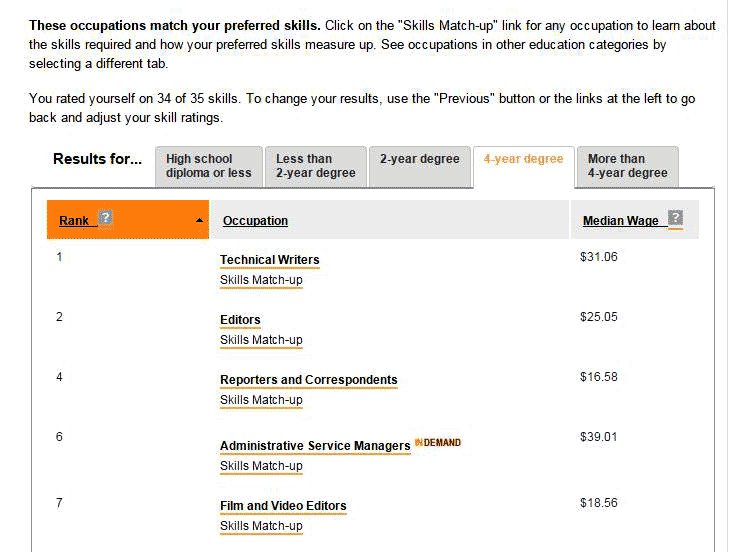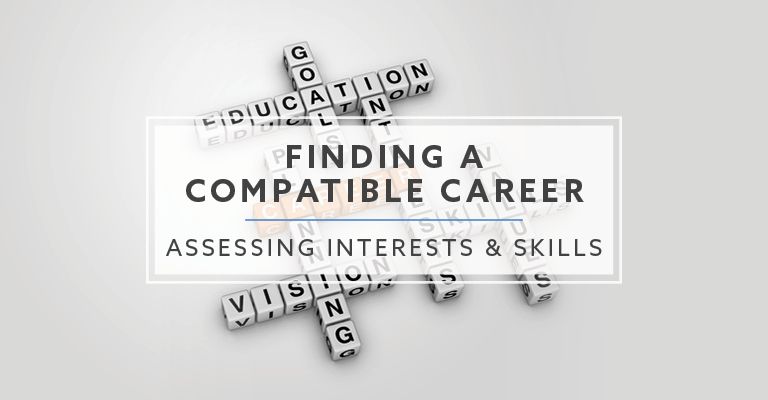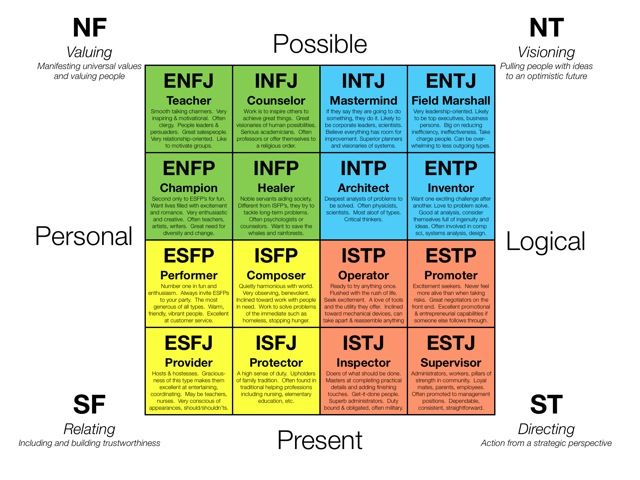There are a variety of tests you can take to help you determine which career best matches your interests, skills and personality. These tests are great for determining what you would like to go to school for, what job you should aim for after school, and what you may want to do if you are considering a career change. Here’s a closer look at some of them:
Career Interest tests
Career interest tests help determine what you enjoy and then match your interests with jobs or career fields; this is kind of like answering the question “What do you want to be when you grow up?” A great thing about these types of tests is they will introduce you to careers that you would likely enjoy. On the downside, though, these tests do not take your actual skills and experience into account so the job you want may not actually be attainable. However, if you find a career that you know you are extremely passionate about and want to pursue, you can then find out what types of education or training you will need to complete in order to do so.
I tried this career interest test and was pretty impressed with the results. Among the careers listed for “best fits” for me were: news anchor, producer, instructor, training development specialist and public relations … all of which I have done and thoroughly enjoyed. Give it a shot and see if the results are a good match for your interests.
Here are some other career interest tests you may want to try too:
Career Aptitude/Skills tests
If you want to focus on your skills rather than simply your interests, career aptitude and skills tests can help you. These tests measure the skills in which you excel and those in which you may be weaker, in order to determine which careers would be the best suited for your skill set. Skills and aptitude tests look at your mathematical knowledge, verbal skills, language fluency, technical skills, computer knowledge as well as many other categories. The results of these tests will help match you to jobs and careers in which you will be highly capable, but on the flip side, you may not necessarily enjoy them. These tests are also great to determine what skills you may want to learn in order to work, and excel, in a desired field.
I took ISEEK’s Skills Assessment test and again was surprised with how accurate the results were for me; the top 3 results are again positions I have held.

As you can see, another great thing about this test is it also lists the median wage for each position so you can get an idea of what your salary would be.
Other aptitude/skills tests to try:
Personality tests
Personality tests take a closer look at your character and psychological makeup; they look at what makes you tick and can help determine your strengths in your personal and work lives. These types of tests can help employers determine if you are a match with other people at the company, will fit in well with the existing team, and can pinpoint what you can bring to the table.
Color coded
When I worked at a university all staff members and students took a personality test to show how we each see things differently. We can’t expect to manage or interact with everyone the same, and that’s why this personality test was so important while dealing with a large number of people at once. The results were based on 4 colors: fiery red, sunshine yellow, earth green and cool blue; each color represented different types of personalities. For example “fiery red” means that person is likely extroverted and has high energy, approaches others in a direct, authoritative manner, and radiates a desire for power and control. On the other hand, “cool blue” means the person is introverted and prefers written communication in order to maintain clarity and precision. After completing the test, staff members could place corresponding color blocks on his or her desk with the most dominant colors on top so others would know how to approach them and build a relationship. As an instructor I would also use the results of the test during my first class session each quarter; I’d ask each student for their color so the other students and I would know how they would best respond to assignments and class discussions.
Myers-Briggs Type Indicator® (MBTI ®)
One of the most well-known personality tests is based on the work of Carl Jung, a famous Swiss psychiatrist, Isabel Briggs Meyer and Katharine Briggs. The Myers-Briggs test measures how you deal with people, process information, and make decisions, among other factors. Based on your results you are then assigned one of 16 personality types:
I took this test to determine my personality type, and like the other tests I again found this one to be pretty spot on. In fact, when I was reading the description for the personality type with which I was matched I almost felt like I had written it about myself. This test then matched me with careers that would work well with my personality: career counselor, editor, marketer, and writer… and guess what; I’ve done them all and thoroughly enjoyed them!
Here are some places you can find out more about your personality type and what careers would be a good match:
Employment tests
When you are applying for new jobs, potential employers may use some or all of the tests above as part of their screening and hiring process. They often use other tests and selection procedures as well, including cognitive tests, emotional intelligence testing, medical examinations, credit checks, and background checks. Companies can legally use tests as part of the hiring process as long as they don’t use to them to discriminate against anyone based on his or her race, color, sex, national origin, religion, disability, or age (40 years old or older). The purpose of the tests is to get a better of idea of which candidates will be able to perform well in the position which will lead to higher productivity and less turnover, saving companies money. While there is no way to study for most of these tests there are things you can do to make the testing process easier:
Relax: the less stressed you are, the better you will be able to focus.
Read the instructions: there’s nothing worse than doing poorly on a test because you failed to complete it correctly.
Leave enough time: if you are rushed you will not be focused, and if you’re not focused you won’t test as well.
Don’t take it personally: if you are asked to take a test (or a few), then that is the company’s policy and they require all potential employees to do the same.
Final thoughts
As you can see there are many types of tests out there that can help you when making decisions about your future; whether you take their advice is up to you. Even if you don’t, I find they are a fun way to learn a little bit more about you.
Have you taken any of these tests before? Were you surprised by the results? Did you ever have to take a test when applying for a job? Did you get it? Let us know about your test-taking results!






